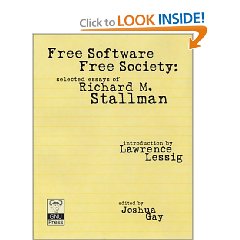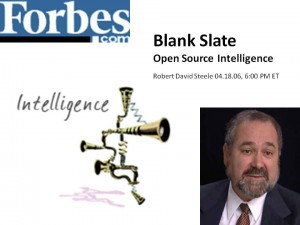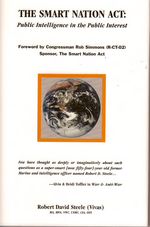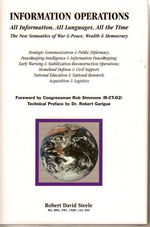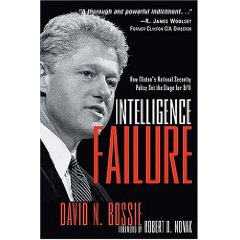
Half Truth, Half Distorted, Largely Uninformed About Reality,
2) The book is also half distortions and mis-representations. This is a hatchet job in advance of the 2006 elections. I am a moderate Republican (and the #1 Amazon reviewer for non-fiction). The dirty little secret of the Bush Administration is that Dick Cheney was given both the terrorism and the intelligence portfolios from day one, and in his arrogance chose to ignore them both despite the fact that the Clinton Administration “woke up” at the end of its term and issues strong warnings. George Bush is also arrogant and ignorant–CIA tried desperately to warn him in person on 6 August 2001 and he dismissed them with a cavalier “OK, you've covered your ass now.” Between a mendacious Vice President and an ignorant little bully of a President, America was completely unprotected in the months when intelligence actually had good cause for alarm and tried desperately–as did Richard Clark–to sound the alarm. Cheney chose instead to focus on secret meetings with Enron and Exxon, and to plan the invasion of Iraq, for which he welcomed a terrorism attack as a “pretext for war”.
The reality is that the truth can be known, but one needs to search for it. There is no better way to scan the literature than to spend a couple of hours with all my reviews (sadly, Amazon allows us to make lists, but not to sort our reviews, so either use the lists or be patient in going through my reviews. They cover information society, intelligence, emerging threats, strategy and force structure, anti-Americanism, and the negative impact on national security of domestic U.S. politcs).
A few specifics:
1) any book endorsed by Woolsey and Novak, for divergent reasons, cannot be trusted to be objective.
2) The author is oblivious to the many books on intelligence from Allen, Baeur, Berkowitz, Codevilla, Gentry, Goodman, Gerecht, Fialka, Godson, Johnson, Levine, Odom, Riebling, Steele, Treverton, Wiebes, Zegart and more. This is a hatchet job with some nuggets, not a balanced piece of research with a historical perspective. Not a single one of these authors is in the bibliography.
3) The author's most grevious error is to confuse reduced presidential attention with incompetence. Clinton was very competent, it was the U.S. Intelligence Community, like the lightbulb in the psychologists joke (“how many to change a bulb? Irrelevant, the bulb has to want to change”), that chose to ignore General Al Gray, myself, and many others who from 1988 were agitating for improved coverage of terrorism and instability, and improved attention to open sources of information.
4) The author makes the usual mistake of failing to note that CIA and FBI failures were not from lack of funding, but from internal myopia and mis-direction. FBI, for example, redirected money appropriated by Congress for information technology, to pay for more travel by chiefs; CIA cut back on its clandestine service, and relied more heavily of foreign liaison lies, and completely failed to heed the 1999 NIMA Commission Report that demanded attention to sense-making and analytic desktop toolkits.
5) The author provides an unbalanced but useful review of the embassy bombings, Khobar Towers (which was sponsored by Iran), and the USS Cole, but in his epilogue, he appears brain-dead in thinking that Bush-Cheney's redirection of the military from Afghanistan to Iraq was brilliant. It was not. It was the most expensive catastrophic, corrupt, ignorant, and mendacious abuse of presidential power in modern history.
This leads to my final general comment: as unethical and incompetent as some individuals might have been in both the Clinton and the Bush Administrations, it is the “system” not the individuals that is broken. Congress is out of the game–incumbents shake down lobbyists for cash, not the other way around; both parties demand “party line” votes instead of conscience votes on behalf of specific constituencies; and the extremist Republican leadership of the House and Senate have abdicated their Constitutional responsibility to be the FIRST (Article 1) Branch of government, and instead chosen to serve as foot-soldiers for the President. This is treason and impeachable mis-behavior. The Executive is no better–Dick Cheney has swept aside the policy process, and it is now documented (see my review of “One Percent Doctrine”) that he has experimented with isolating the President since President Ford, and under Bush, directed policies that were neither cleared by the bureaucracy, nor reported to and approved by the President. Cheney, not necessarily Bush, is clearly impeachable.
So buy and read this book, but do not stop there. We the People now have a digital memory, and we are being aroused from our slumber. Justice will be done, eventually. Both Administrations failed America, but only because the public failed to stem the corporate take-over of Washington, D.C., and failed to exercise its ultimate right to hold everyone accountable day to day, not just on election day.



